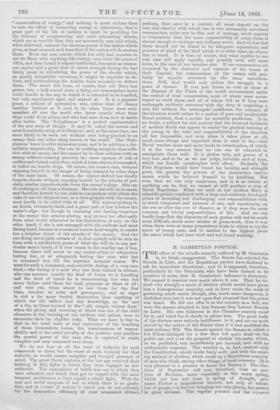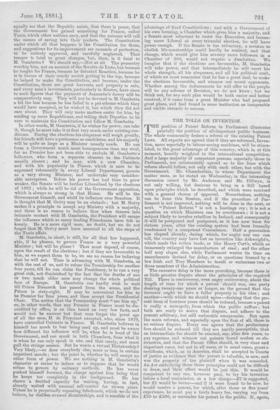M. GAMBETTA'S POSITION.
THE effect of the rebuffs recently suffered by M. Gambetta is, we think, exaggerated, The Senate has rejected the Scrutin de Liste, and the Republican parties have declined to ask for immediate dissolution ; and it is supposed, therefore, particularly by the Orleanists, who have been trained to be sensitive to votes, that M. Gambetta's influence is destroyed. We suspect it remains very much where it was. That be de- sired very strongly a mode of election which would have given him a homogeneous majority, and so have made the work of governing much easier, though, also, much more dangerous, is doubtless true, but it was not upon that proposal that his power was based. He did not offer it to the country as a bait, nor were the masses attached to him because they desired Scrutin de Liste. His own followers in the Chamber scarcely cared for it, and voted for it chiefly to please him. The groat body of the electors were entirely indifferent to it, and are no more moved by the action of the Senate than if it had modified the most ordinary Bill. The threats against the Senate in which a few Ultras indulged for a few days fell quite dead on the public ear, and even the proposal to abolish life-seats, which, as we predicted, was immediately put forward, met with no enthusiastic response. The country is, in fact, content with the Constitution, which works fairly well ; and with the exist- ing method of election, which sends up a Republican majority of men who think, among other things, of local interests. (It is very pleasant to a peasant to know his Deputy.) The elec- tions of September will not, therefore, turn on pro- jects of Revision, more especially as the warm spring, which yet has not been a spring of drought, pro- mises France a magnificent harvest, not only of wheat, but of grapes,—a harvest bringing not only plenty, but money in great streams. The regular peasant and the viperon
equally see that the Republic exists, that there is peace, that the Government has gained something for France, called Tunis, which other nations envy, and that the autumn will roll the means of saving into their pockets. The Constitution under which all that happens is the Constitution for them, and suggestions for its improvement are counsels of perfection, to be entirely approved, and carefully neglected. That temper is fatal to great changes, but, then, is it fatal to
M. Gambetta 1 We should say,—Not at all. The peasantry
worship him, not on account of the Scrutin de Liste,but because he fought for France, because he defeated Reaction, because he is in favour of their couche sociale getting to the top, because he helped to make the Constitution, and because, under the Constitution, there are great harvests, and property is safe, and every man's investments, particularly in Rentes, have risen to such figures that the payment of Jeannette's dowry will be comparatively easy. They will not be devoted to M. Gambetta
a bit the less because he has failed in a pet scheme which they would have accepted, as he wished it, but which they did net care about. They will only make matters easier for him, by sending up more Republicans, and telling their Deputies to be sure to maintain the Constitution and follow M. Gambetta.
In other words, M. Gambetta, if he wishes for power, can take it, though he must take it at first very much under existing con- ditions. During the elections his eloquence will weigh greatly, his friends will have a preference as candidates, and his majority
will be quite as large as a Minister usually needs. He can form a Government much more homogeneous than any rival, for no Premier has yet been able to exclude M. Gambetta's followers, who form a separate element in the Cabinets usually chosen ; and be may, with a new Chamber, and with his popularity in France, which is sure to be expressed vehemently in every Liberal Department, govern as a very strong Minister, and undertake very consider- able enterprises. Before his power has had time to grow weaker, the Senate will be farther Liberalised by the elections of 1882 ; while he will be rid of the Government opposition, which is always so strong in that House. He will be the Government himself, and wield its influence over Senators. It is thought that M. Grdvy may be an obstacle ; but M. Gr6vy makes it a principle to accept any Ministry with a majority, and there is no reason to believe that when thrown into intimate contact with M. Gambetta, the President will escape the influence which so many leading Frenchmen have felt so keenly. He is a more rigid man, no doubt, but we do not forget that M. Gr(ivy must have assented to all the steps of the Tunis affair.
M. Gambetta, in short, is still, for all that has happened, able, if he pleases, to govern France as a very powerful Minister ; but will he please ? That must depend, of course, upon the result of the elections ; but if they are favourable to him, as we expect them to be, we see no reason for believing that he will not. Time is advancing with M. Gambetta, as with the rest of us, and to refuse the Premiership for another four years, till he can claim the Presidency, is to run a very great risk, not diminished by the fact that the deaths of one or two much older men may change the whole political face of Europe. M. Gambetta can hardly wish to wait till Prince Bismarck has passed from the scene, and the Prince is sixty-eight. It may be convenient for him to be Premier for four years, and then accept the Presidential Chair. The notion that the Premiership must "use him up," or, in other words, that any Premier in France must be dis- credited by office, is an idea based on very few facts, and would not be current but that men forget the'great age of all the men, AL de Freycinet excepted, who, since 1870, have controlled Cabinets in Prance. M. Gambetta believes in himself too much to fear being used up, and must be aware how different his influence will be, when he is head of the Government, and can speak in both Chambers, from what it is when he can only speak in one, and that rarely, and must pull the strings unseen. But he wants a virtual Dictatorship ? Very likely,—so does everybody else, more or less, in certain impatient moods ; but the point is, whether he will accept no other form of power. We see nothing in M. Gambetta's character or career to induce us to suppose that he would refuse to govern by ordinary methods. He has never pushed himself forward, the charge against him being that he keeps too completely in the background. He has shown a decided capacity for waiting, having, in fact, already waited with unusual self-control for eleven years. 'Unless he is perpetually repeating falsehoods, which we do not believe, he dislikes avowed dictatorships, and is sensible of the
advantage of fixed Constitutions ; and with a Government of his own forming, a Chamber which gives him a majority, and a Senate most reluctant to resist the Executive, and becom- ing more Liberal at every triennial election, he will have power enough. If the Senate is too refractory, a revision to abolish life-senatorships could hardly be resisted, and that change, which would give him seventy more followers in a Chamber of 300, would not require a dissolution. We imagine that if the elections are favourable, M. Gambetta will take power, and that intermediately he will exert his whole strength, all his eloquence, and all his political craft, of which we must remember that he has a great deal, to make the elections favourable, and winnow out secret opponents. Whether among the inducements he will offer to the people will be any scheme of Revision, we do not know ; but we think not, for any such plan would be both easier and better received, if it came from a great Minister who had proposed great plans, and had found in some institution an insuperable and visible obstacle to success.

































 Previous page
Previous page